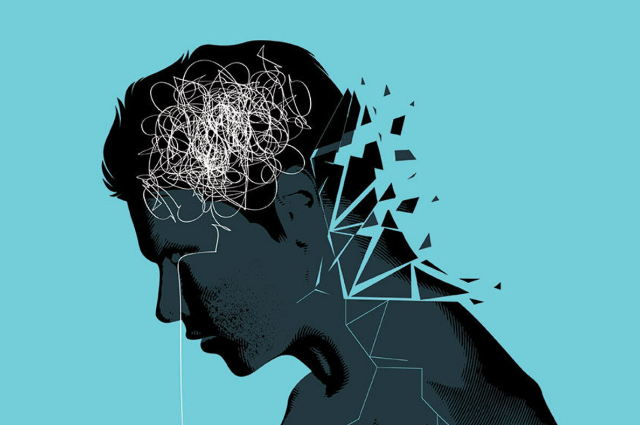What Is A Taboo?
In the simplest of terms, a taboo is the restriction or prohibition of something either by social or religious customs. For example, in certain cultures marrying people from other cultures is considered a taboo, Another example of a taboo would be Muslims being forbidden from eating pork or drinking similarly, Hindus not being allowed to eat non-vegetarian.
The first example was a taboo put in place by the society while the latter two are examples of religious taboos. India is a country that highly values culture and societal norms. If anyone deviates even a little from them, they are looked down upon.
Forget outsiders, family members and close relatives go on harping about the all too familiar phrase, "Log Kya Kehenge? (What will people say?)" This causes numerous problems because an individual's thoughts and needs are completely ignored in favour of what society deems acceptable.
One of the areas which this affects the most is Mental Health & its care in India, which is even now in the 21st century considered a taboo by the society.
India & Mental Health
The fact that people can suffer from mental illnesses that hamper their daily life is still considered an alien concept in India. Any physical/chronic illness is treated with urgency and given the needed care but for mental illnesses, Indians refuse to acknowledge its very existence!
Now when one acts like the issue doesn't exist how can its treatment and healthcare facilities be given due importance. Parents continue to call their mentally ill kids "lazy" and force upon them burdensome expectations without realising the long term harm it is causing.
Then when things finally explode and there is no other option but to get professional help, the whole "log kya kehenge?" thing takes centre stage. Needing help to manage one's mental health is considered a heinous crime which must not be revealed to anyone.
It is considered a taboo, because of the mindset of Indian society, their ideology of needing the care to remain mentally healthy, being a shameful act worsens the prospects of potential future sufferers seeking help. Mental illness is deemed a blotch on the honour of an average Indian family.
"How can you be so weak? Depression, Anxiety because of studies? We studied much harder than you, why didn't we get any of it?"
"Excuses, Just excuses that's what Mental illnesses are." That is what the elders of families say to the young ones who dare to raise their voices and ask for help when they need it, instead of accepting the taboos & toxicities of their culture.
The older generations have continued to accept these ridiculous taboos and unacceptable options of honour creating toxic environments which have done more harm than good for the future generations.
This has led to families with disassociated younger generations, who either run away from their homes or ultimately end their lives, no longer being able to handle the stress.
Results Of The Taboo
A report states that as per WHO about 56 million Indians suffer from depression and another 38 million Indians suffer from anxiety disorders.
Despite the staggering figures mentioned above India doesn't have adequate mechanisms in place to identify the relevant mental issues existing in the society and deal with them appropriately.
A report back in 2021 by the WHO stated that 7.5 percent of Indians suffered from some mental disorder and predicted that by the end of 2021 roughly 20 percent of India would suffer from mental illnesses.
Now in 2022, it seems the situation could worsen with the impact of Covid, and the losses incurred in the past 2 years the reopening of schools, colleges, etc. will put paramount pressure on the everyone to perform even better so as to cover up all the lost time, money & knowledge.
It is the need of the hour that India stops being restricted by such unreasonable taboos. It is time to change for the betterment of the present and future generations.
Time For Change
Generations have suffered, families have lost loved ones just to uphold these harmful taboos set up by societies at a time when literacy rates were at their lowest and there was a general lack of awareness,
India is one of the fastest-growing economies in the world with an enormous and still growing population. For the sake of the country's bright future, we need to eradicate any such outdated Taboos or societal norms which create for the citizens.
In the current era, where most people are educated and aware enough to understand the impact deteriorating mental health can have not only on the person experiencing it but his/her loved ones, we need to build a safe environment to help them heal and get back to the society.
Rather than have them shooed away and isolated, which unfortunately worsens their condition making them not capable to return to society. Proper mental health drives should be done throughout the country to help identify the major mental issues in today's youth, mental hospitals and chambers for psychologists should be set up in every major town so when people need help it's easily available to them and affordable.
The above-mentioned methods are how the government can help curtail the taboos, but the main job is actually of the society. To acknowledge the existence of mental issues and the importance of mental health. The fact that someone dealing with it is not a shameful act nor a thing to be hidden.
Most certainly not a taboo. An effort must be made by the older generations to move out of their toxic mindset and learn to communicate and understand the present generation and the reasons why mental issues are on the rise. And accordingly, try to help in making the younger generation feel better.

